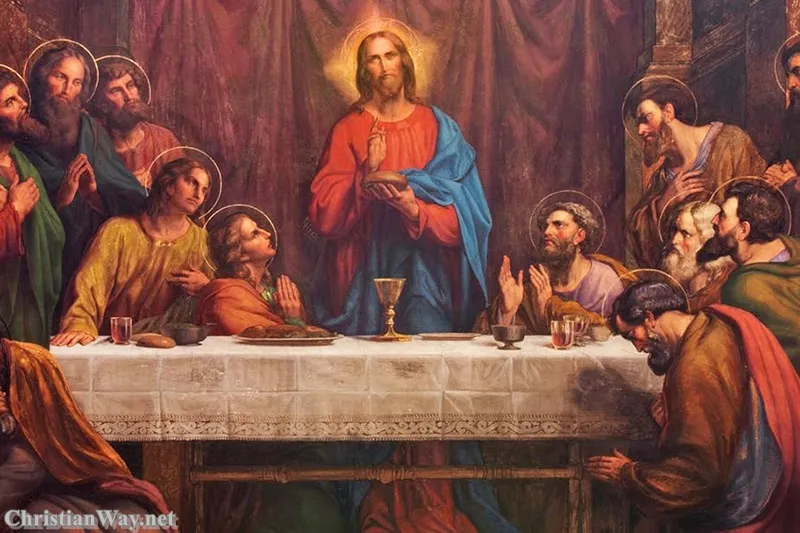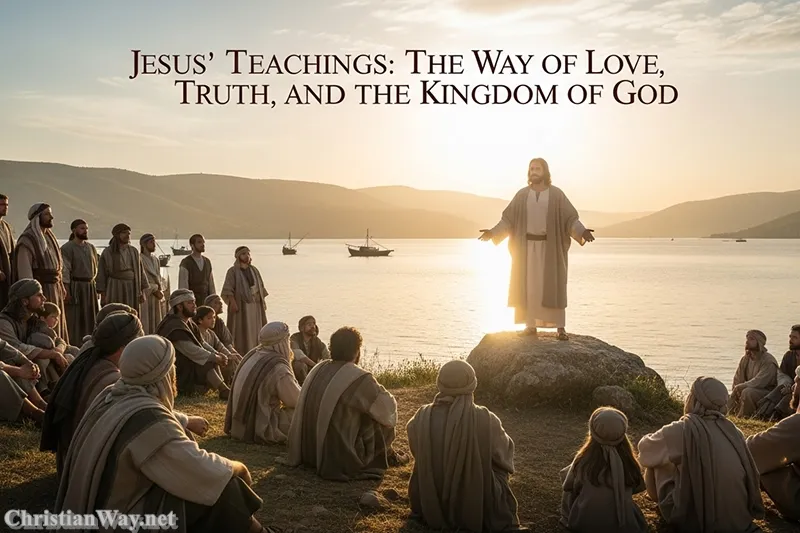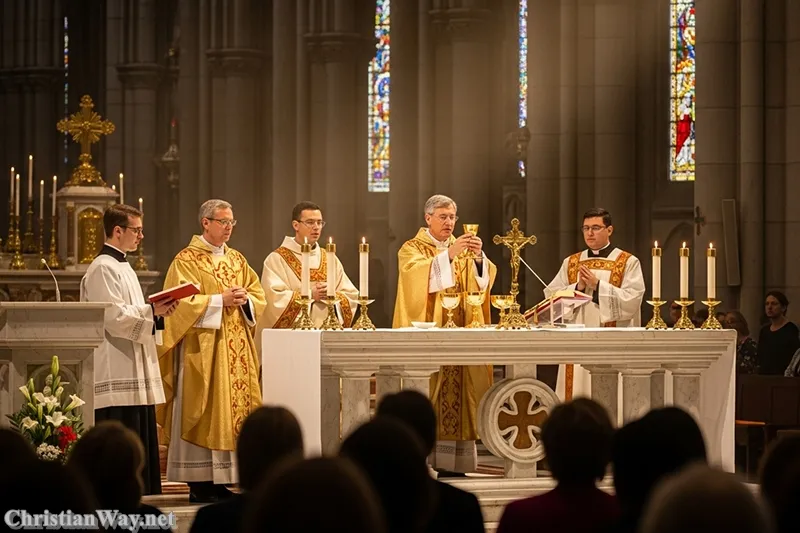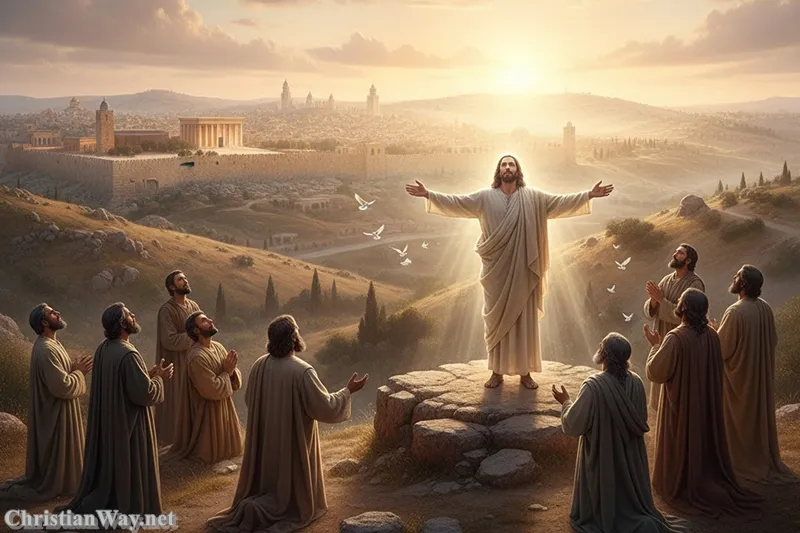Dear friends in Christ,
Every great story of faith begins with a call — a voice that breaks through the noise of ordinary life and says, “Follow Me.” So it was with the Apostles. They were fishermen and tax collectors, ordinary men with weary hands and unremarkable lives. Yet when Jesus passed by, something in His gaze awakened them. In that instant, they left their nets, their homes, and their pasts to walk with Him — not because they understood all things, but because they had encountered Someone whose presence filled their souls with truth and peace.

The story of the Apostles is not merely history; it is a mirror of the Church’s heart and of our own discipleship. For in each of them — Peter, Andrew, James, John, Matthew, and the rest — we find not perfection, but transformation. They are living proof that God calls not the qualified but qualifies the called. Through them, Christ laid the foundation of His Church, teaching us that holiness begins with surrender and grows through love.
The Call of the Twelve: From Fishermen to Disciples
When Jesus first called the Apostles, His invitation was both simple and radical: “Come, follow Me.” (Matthew 4:19). It was not an offer of comfort or fame, but of purpose. He gathered them not as scholars of the Law, but as seekers of truth — men who would walk beside Him, listen to His words, and witness His works.
Leaving Everything Behind
The Gospel tells us that Peter and Andrew immediately left their nets, and that James and John left their father in the boat. This leaving behind was not only physical but spiritual — a detachment from the old life to embrace the unknown. Christ did not promise them security; He promised them Himself. That was enough.
We often imagine discipleship as a heroic act, but it is, in truth, a daily “yes” spoken through weakness and wonder. The Apostles remind us that every call from God requires a leaving — of pride, comfort, or fear — so that we may follow Him more freely.
The Mystery of the Number Twelve
Jesus chose twelve Apostles to symbolize the renewal of Israel’s twelve tribes. In them, the new covenant began to take flesh. They were to become not only followers but foundations — “the twelve pillars” upon which the Church would rise (cf. Revelation 21:14). Through their unity, the Church’s mission would echo Christ’s own prayer: “That they may be one, as We are one.” (John 17:22).
The Apostles as Witnesses of the Living Christ
To be an Apostle is to be a witness — not merely of words or doctrines, but of a Person. The Apostles were chosen to see, to touch, to hear the Word made flesh.
The Experience of Walking with Jesus
For three years they followed Him through the hills of Galilee and the streets of Jerusalem. They heard Him teach the Beatitudes, watched Him heal the sick, and listened as He spoke of His coming Passion. They saw His humanity — His weariness, His tears, His joy. Yet in every moment, they began to perceive the divine mystery hidden in this man from Nazareth.
When Peter confessed, “You are the Christ, the Son of the living God,” (Matthew 16:16), it was not the result of human insight, but of grace. In Christ’s light, their hearts were opened to the truth that this Teacher was not merely a prophet — He was God among them.
Witnesses of the Resurrection
The Apostles’ true mission began not with the call, but with the Resurrection. When the Risen Christ appeared to them, fear turned into faith, despair into proclamation. Their eyes beheld what no mortal had ever seen — death defeated, life restored, love triumphant.
From that moment, their lives were no longer their own. As Jesus breathed the Holy Spirit upon them and said, “As the Father has sent Me, so I send you,” (John 20:21), the Church was born. The Apostles became living vessels of the Spirit, carrying the Gospel from Jerusalem to the ends of the earth.
The Apostolic Mission: Foundations of the Church
The Power of Pentecost
On Pentecost morning, the Apostles gathered in fear, unsure of the future. But when the Holy Spirit descended as tongues of fire, they were filled with courage. The once-timid fishermen became fearless preachers of divine truth. Peter’s voice resounded across Jerusalem, proclaiming that Jesus, whom they had crucified, was Lord and Christ. Three thousand souls were baptized that day.
This moment is the birth of the Church’s mission — a mission rooted in witness, not power; in service, not conquest. The same Spirit that filled them continues to guide the Church today, reminding us that every Christian shares in that apostolic calling: to bear witness to Christ with both word and life.
Apostolic Authority and Unity
From the beginning, the Apostles held a unique authority given by Christ. He said to Peter, “You are Peter, and on this rock I will build My Church.” (Matthew 16:18). Peter’s primacy among them was not one of dominance but of service — to keep the faith unified and the Church faithful to its foundation.
In Catholic, Orthodox, Anglican, and Protestant traditions alike, the idea of apostolicity remains central: the belief that the Church’s faith and mission must always trace back to the Apostles and to Christ Himself. This apostolic succession — spiritual, doctrinal, and sacramental — ensures that what we believe today is not a new invention, but the living continuity of the Gospel first preached in Galilee.
The Humanity of the Apostles: Faith, Fear, and Transformation
Weakness and Grace
The beauty of the Apostles lies not in their perfection but in their humanity. Peter denied Jesus. Thomas doubted. James and John sought glory. Yet each was redeemed, forgiven, and transformed. Their failures became the soil in which grace bore fruit.
In Peter’s tears, we see the mercy of Christ. In Thomas’s doubt, we see the patience of the Lord. In Paul’s conversion, we see the boundless reach of divine grace. The Apostles’ humanity gives us hope — that God’s call is not hindered by our weakness but glorified through it.
The Transformation of Peter
Peter, the fisherman from Capernaum, was impulsive and often fearful. Yet Jesus saw in him the heart of a shepherd. After his threefold denial, Peter was restored by a threefold confession: “Lord, You know that I love You.” (John 21:17). From that moment, he became the Rock — not because he was unshakable, but because his faith had been purified through love.
The Zeal of Paul
Although not one of the original Twelve, St. Paul is called an Apostle because of his direct encounter with the Risen Christ on the road to Damascus. From persecutor to preacher, his life testifies that no one is beyond redemption. His letters form much of the New Testament, shaping Christian thought and practice across the centuries.
Paul’s journey reminds us that the Apostolic mission is not limited to a time or group but extends to every heart set ablaze by Christ’s mercy.
The Apostolic Legacy in the Church Today
The Creed and the Church’s Teaching
Every time we profess the Nicene Creed and say, “I believe in one, holy, catholic, and apostolic Church,” we affirm that our faith stands on the foundation laid by the Apostles. Their witness is not confined to Scripture; it lives in the Church’s sacraments, teaching, and unity.
Through bishops and priests, through councils and the shared confession of faith, the Church continues to echo their voice: the same Gospel once heard on the shores of Galilee now resounds in every language and nation.
Apostolic Mission in Every Believer
We too are called to live apostolically — to bring Christ into the world around us. Every baptized Christian shares in this mission: parents teaching faith to their children, workers living with integrity, neighbors showing compassion. The Apostles’ mission becomes ours when we love as they loved and speak as they spoke: with courage, humility, and joy.
The Apostles as Saints and Companions
Across Christian traditions, the Apostles are honored not as distant heroes but as spiritual companions. Their relics rest in cathedrals, their names mark churches and feast days, their words fill our prayers.
Each Apostle reveals a facet of Christ’s own love:
- Peter, steadfast in faith.
- John, the beloved, gentle in charity.
- James, courageous unto martyrdom.
- Andrew, the first called, bringing others to Christ.
- Thomas, who moved from doubt to confession.
- Matthew, who left wealth for mercy.
- Paul, tireless in proclaiming grace.
Together, they form the living constellation that still lights the Church’s journey — witnesses who remind us that discipleship is not a path of comfort, but of communion.
Reflect and Pray
The Apostles began as ordinary men, yet through their encounter with Christ, they became extraordinary bearers of His presence. Their story calls us to listen for the same voice that once said, “Follow Me.”
We may not walk the dusty roads of Galilee, but the invitation remains. In every Mass, in every prayer, in every act of love, Christ calls us anew to be His witnesses. The world still hungers for the light the Apostles carried — and that same flame burns now within us.
Let us pray:
Lord Jesus Christ,
You called the Apostles to follow You and made them the foundation of Your Church.
Strengthen us to walk in their footsteps — to bear witness to Your truth with courage,
to love with Your heart, and to serve with Your hands.
May the fire of Pentecost burn within us,
that through our lives, Your Gospel may reach every soul in need of light.
Amen.
— Fr. John Matthew, for Christian Way





